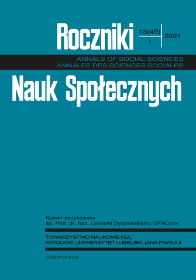Religious Identity in the Era of the Mediatization of Religion
Abstract
The main goal of the article is to present Leon Dyczewski’s concept of religious identity in the era of the mediatization of religion, and to describe the dynamics of this process in the context of the COVID-19 pandemic. The subject is an important part of the contemporary discourse on religious identity in the age of a pandemic and opens up new interesting problem issues.The article is divided into three parts. The first part discusses Dyczewski’s concept of religious identity. Then I present the issue of the mediatization of religion and how it affects religious identity. Finally, I carry out an empirical analysis of religious discourses on the Internet during the COVID-19 pandemic. Messages are treated as media products that construct the content elements of religious identity.
References
Asp K. (1986), Mäktiga massmedier: Studier i politisk opinionsbildning [Powerful mass media: studies in political opinion-formation], Stockholm: Akademilitteratur.
Barmania S., Reiss M.J. (2020), Religion and Science in a Time of COVID-19: Allies or adversaries?, https://blogs.scientificamerican.com/observations/religion-and-science-in-a-time-of-covid-19-allies-or-adversaries/ [dostęp: 20.02.2021].
Berger P.L. (1967), The sacred canopy. Elements of a sociological theory of religion, Garden City, NY: Anchor Books.
Campbell H.A. (2005a), Exploring religious community online: We are one in the network, New York: Peter Lange.
Campbell H. (2005b), Spiritualising the internet. Uncovering discourses and narratives of religious Internet usage, Heidelberg Journal of Religions on the Internet, nr 1, s. 1-26.
Campbell H. (2007), Who’s got the power? Religious authority and the Internet, Journal of Computer-Mediated Communication, nr 12(3), s. 1043-1062.
Couldry N. (2008), Mediatization or mediation? Alternative understandings of the emergent space of digital storytelling, New Media & Society, nr 10 (3), s. 373-391.
Couldry N., Hepp A. (2013), Conceptualizing mediatization: Contexts, traditions, arguments, Communication Theory, nr 23, s. 191-202.
Czyżewski M., Kowalski S., Piotrowski A. (1997), Rytualny chaos. Studium dyskursu publicznego, Kraków: Aureus.
Dyczewski L. (1995), Kultura polska w procesie przemian, Lublin: Towarzystwo Naukowe KUL.
Dyczewski L. (2004), Społeczno-kulturowy kontekst religijności, [w:] K. Góźdź, K. Klauza, C. Rychlicki, H. Słotwińska, P. Szczur (red.), Kościół w życiu publicznym. Teologia polska i europejska wobec nowych wyzwań, Lublin: Wydawnictwo KUL, s. 225-228.
Dyczewski L. (2009a), Katedra Socjologii Kultury. Tożsamość społeczno-kulturowa i komunikacja społeczna, [w:] S. Fel, J. P. Gałkowski, J. Zabielska (red.), Tradycja i współczesność. 90 lat socjologii w Katolickim Uniwersytecie Lubelskim, Lublin: Wydawnictwo KUL 2009, s. 153-161.
Dyczewski L. (2009b), Wartości kulturowe ważne dla polskiej tożsamości, [w:] L. Dyczewski, D. Wadowski (red.), Tożsamość polska w odmiennych kontekstach, Lublin: Wydawnictwo KUL, s. 149-179.
Dyczewski L. (2010), Tożsamość Europy Środkowo-Wschodniej w procesach jednoczenia się Europy, [w:] L. Dyczewski, J. Szulich-Kałuża, R. Szwed (red.), Stałość i zmienność tożsamości, Lublin: Wydawnictwo KUL, s. 359-372.
Dyczewski L. (2011), Kultura w całościowym planie rozwoju, Warszawa: Instytut Wydawniczy PAX.
Dyczewski L. (2015a), Tożsamość religijna, [w:] L. Dyczewski, K. Jurek (red.), Tożsamość religijna w nowoczesności, Lublin: Wydawnictwo KUL, s. 9-27.
Dyczewski L. (2015b), Religion: Spirituality in modernity, [w:] L. Dyczewski (red.), Secularization and development of religion in modern society, Washington: The Council for Research in Values and Philosophy.
Dyczewski L. (2016), Sacrum w przestrzeni publicznej, [w:] J. Adamkowski, M. Tymochowicz, Sacrum w kulturze tradycyjnej i współczesnej, Lublin, Wrocław: Polskie Towarzystwo Ludoznawcze, Wydanictwo UMCS, s. 15-27.
Eisenstein E. (1993), The printing revolution in early modern Europe, Cambridge, New York, Melbourne, Madrid, Cape Town, Singapore, São Paulo: Cambridge University Press.
Foucault M. (2002), Porządek dyskursu, tłum. M. Kozłowski, Gdańsk: słowo/obraz terytoria.
Guzek D. (2017), Chrzest Polski w mediach, Studia Medioznawcze, nr 1, s. 89-101.
Halicka M., Szafranek A., Dakowicz L. (red.) (2018), Mistrz i Przyjaciel. Ojciec Profesor Leon Benigny Dyczewski OFMConv, Białystok: Wydawnictwo Uniwersytetu w Białymstoku.
Hjarvard S. (2008), The mediatization of society. A theory of the media as agents of social and cultural change, Nordicom Review, nr 2, s. 105-134.
Hjarvard S. (2012), Three forms of mediatized religion. Changing the public face of religion, [w:] S. Hjarvard, M. Lövheim (red.), Mediatization and religion. Nordic Perspectives, Göteborg: University of Göteborg, s. 21-44.
Hjarvard S. (2013), The mediatization of culture and society, London, New York: Routledge.
Hojsgaard M.T. (2005), Cyber-religion: On the cutting edge between the virtual and the real, [w:] M.T. Hojsgaard, M. Wartburg (red.), Religion and cyberspace, London: Routledge, s. 50-63.
Krotz F. (2001), Die Mediatisierung kommunikativen Handelns. Der Wandel von Alltag und sozialen Beziehungen, Kultur und Gesellschaft durch die Medien, Wiesbaden: Westdeutscher Verlag.
Krotz F. (2007a), The meta-process of ‘mediatization’ as a conceptual frame, Global Media and Communication, nr 3, s. 256-260.
Krotz F. (2007b), Mediatisierung: Fallstudien zum Wandel von Kommunikation, Wiesbaden: VS Verlag für Socialwissenschaften.
Leśniczak R. (2019), Mediatization of institutional communication of the Catholic Church. Reflections on the margins of the migration crisis, Studia Medioznawcze nr 3, s. 237–246.
Luckmann T. (1996), Niewidzialna religia, Kraków: Zakład Wydawniczy „Nomos”.
Mayr O. (1986), Authority, liberty, and automatic machinery in early modern Europe, Baltimore: Johns Hopkins University Press.
Mariański J. (2017), Tożsamości religijne w społeczeństwie polskim. Studium socjologiczne, Toruń: Wydawnictwo Adam Marszałek.
McLuhan M. (1967), Understanding media: The extensions of man, London: Routledge and Kegan Paul.
Parish H. (2020), The absence of presence and the presence of absence: Social distancing, sacraments, and the virtual religious community during the COVID-19 pandemic, Religions, nr 6, s. 1-15, doi:10.3390/rel11060276
Seul J. (1999), Ours is the way of God: Religion, identity, and intergroup conflict, Journal of Peace Research, nr 5, s. 553-569.
Schulz W. (2004), Reconstructing mediatization as an analytical concept, European Journal of Communication, nr 1, s. 87-101.
Sierocki R. (2018), Praktykowanie religii w nowych mediach. Katolicka przestrzeń Facebooka Toruń: Wydawnictwo Adam Marszałek.
Silverstone R. (2002), Complicity and collusion in the mediation of everyday life, New Literary History, nr 4, s. 761-780.
Świątkiewicz W. (2017), Przedmowa, [w:] J. Mariański, Tożsamości religijne w społeczeństwie polskim. Studium socjologiczne, Toruń: Wydawnictwo Adam Marszałek, s. 13-16.
Copyright (c) 2021 Roczniki Nauk Społecznych

This work is licensed under a Creative Commons Attribution-NonCommercial-NoDerivatives 4.0 International License.


